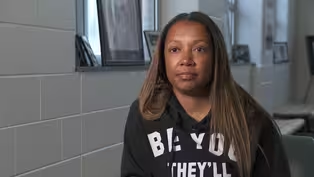VPM News Focal Point
Combatting Black maternal health disparities
Clip: Season 3 Episode 5 | 4m 27sVideo has Closed Captions
Doctors at Eastern Virginia Medical School focus on improving Black maternal health care.
Black women in America are three times more likely to die from a pregnancy-related cause than white women, according to the Centers for Disease Control and Prevention. Doctors at Eastern Virginia Medical School in Norfolk are working to address the problem of Black maternal health disparities.
Problems playing video? | Closed Captioning Feedback
Problems playing video? | Closed Captioning Feedback
VPM News Focal Point is a local public television program presented by VPM
The Estate of Mrs. Ann Lee Saunders Brown
VPM News Focal Point
Combatting Black maternal health disparities
Clip: Season 3 Episode 5 | 4m 27sVideo has Closed Captions
Black women in America are three times more likely to die from a pregnancy-related cause than white women, according to the Centers for Disease Control and Prevention. Doctors at Eastern Virginia Medical School in Norfolk are working to address the problem of Black maternal health disparities.
Problems playing video? | Closed Captioning Feedback
How to Watch VPM News Focal Point
VPM News Focal Point is available to stream on pbs.org and the free PBS App, available on iPhone, Apple TV, Android TV, Android smartphones, Amazon Fire TV, Amazon Fire Tablet, Roku, Samsung Smart TV, and Vizio.
Providing Support for PBS.org
Learn Moreabout PBS online sponsorshipDENNIS TING: It was supposed to be a joyful time for Allison Moore, a Virginia woman learning she would become a mother to a baby girl named Peyton.
ALLISON MOORE: I found out on Christmas day of 2021.
DENNIS TING: But 20 weeks into her pregnancy, Allison felt something wasn't right.
ALLISON MOORE: And the next thing I know, I hear whoosh.
DENNIS TING: Allison was rushed to Eastern Virginia Medical School.
After several days in the hospital, the expectant mother realized something was wrong.
ALLISON MOORE: And when the nurse came in, she was looking for her, I said, 'She's gone.'
And about 10 minutes after that, I became sick.
DENNIS TING: Allison's story is not unique.
In the United States, Black women face significantly higher rates of health complications and death during pregnancy and childbirth when compared to white women.
And most of these maternal deaths are preventable.
LINDSAY ROBBINS: Those numbers show that Black women die about 2.5, 2.6 times higher than white women.
DENNIS TING: It's a problem close to Dr. Lindsay Robbins' heart, who has treated many Black women through their pregnancies, including Allison.
LINDSAY ROBBINS: I have to remember those statistics, even though it feels like it's not happening to this person in front of me, I know that it could.
DENNIS TING: Dr. Robbins is the director of the Center for Maternal and Child Health Equity and Advocacy at Eastern Virginia Medical School.
The center's goal is to eliminate these disparities by researching the causes and finding solutions to this complex problem.
LINDSAY ROBBINS: When we look at a health outcome, there's of course the patient and there's the medical team, but there's also the community and the societal structures.
DENNIS TING: The center, founded two years ago, uses data to better understand the problem of disparities in Black maternal health, and to advocate for better policies and guidelines.
GLORIA TOO: Cardiovascular disease is the number one cause of maternal mortality in the United States, and it's overrepresented in our Black patients, unfortunately.
So here we are working really closely with our cardiology colleagues, our anesthesia colleagues, as well as the hospital to provide comprehensive care during pregnancy, during delivery itself, and making sure we have a comprehensive plan for monitoring afterwards.
DENNIS TING: Dr. Gloria Too and Dr. Robbins both work to address these issues.
The Centers for Disease Control and Prevention says factors that contribute to racial disparities include variation in quality healthcare, underlying chronic conditions, structural racism, and implicit bias.
And this has led to resources being unevenly allocated in the community.
LINDSAY ROBBINS: And the only way to eliminate disparities is to have an even playing field that starts way before the pregnancy even begins.
GLORIA TOO: We have a challenging population because we have a lot of patients who don't have healthcare coming into pregnancy.
We're diagnosing things like chronic hypertension, diabetes, sometimes even things like structural heart issues.
DENNIS TING: For Allison, she says her experience with her miscarriage taught her lessons about advocating for herself.
Lessons that became very important when she learned she was pregnant once again, just 10 months later.
And when she started having complications once again at 20 weeks.
ALLISON MOORE: It was like we were reliving a nightmare for a second.
LINDSAY ROBBINS: And look at your little fancy UGGs.
DENNIS TING: This time, Allison and her doctors at EVMS were able to deliver her daughter Sidney, three-and-a-half months premature.
ALLISON MOORE: Are you losing everything?
You're losing your shoes.
DENNIS TING: Now, six months later, Allison says baby Sidney is doing well.
She wants to share her story, to send a message to other Black women.
ALLISON MOORE: Don't hope.
Always advocate for yourself.
Always stand up for yourself.
If you come across as the angry Black woman, it's your body, you have to.
This is your child.
You have to.
DENNIS TING: While the disparities in Black maternal health continue to be troubling and frustrating, Dr. Robbins says she is optimistic about the increased focus on this problem, and that patients like Allison are being more active in advocating for themselves.
LINDSAY ROBBINS: What brings me the greatest joy is talking to patients and learning more about them, and then seeing their joy at the end of a pregnancy that they've worked really hard for.
DENNIS TING: For VPM News, I'm Dennis Ting.
Video has Closed Captions
Clip: S3 Ep5 | 10m 52s | Deone Allen calls for the School Board to take action to remedy children being mistreated. (10m 52s)
Civil Rights Figure Gets a Step Closer to the U.S. Capitol
Video has Closed Captions
Clip: S3 Ep5 | 2m 12s | Teenage civil rights figure is one step closer to her place in the U.S. Capitol. (2m 12s)
Diversity is top priority for new DAR leadership
Video has Closed Captions
Clip: S3 Ep5 | 3m 19s | DAR makes diversity a top priority as chapters welcome descendants of “Forgotten Patriots. (3m 19s)
Exploring what it means to be Melungeon
Video has Closed Captions
Clip: S3 Ep5 | 6m 57s | Melungeons are an ethnic group of mixed ancestry with roots in Appalachia. (6m 57s)
Video has Closed Captions
Clip: S3 Ep5 | 7m 30s | With the help of at-home DNA tests, many are discovering stories hidden in their ancestry. (7m 30s)
Providing Support for PBS.org
Learn Moreabout PBS online sponsorship
- News and Public Affairs

Top journalists deliver compelling original analysis of the hour's headlines.

- News and Public Affairs

FRONTLINE is investigative journalism that questions, explains and changes our world.












Support for PBS provided by:
VPM News Focal Point is a local public television program presented by VPM
The Estate of Mrs. Ann Lee Saunders Brown




